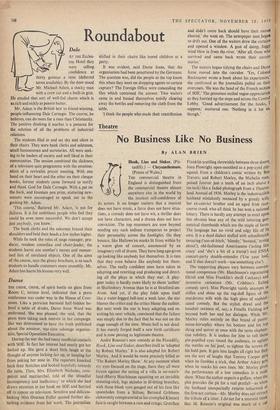Roundabout
Dale
AT THE Eccles- ton Hotel they were selling confidence at thirty guineas a time (deferred terms available). By the door stood Mr. Michael Adam, a stocky man with a crew cut and a built-in grin.
He exuded that sort of well-fed charm which is as rich and sickly as peanut butter.
The students filed in and sat shy and silent in their chairs. They were bank clerks and salesmen, small businessmen and secretaries. All were seek- ing to be leaders of society and well liked in their communities. The session combined the slickness of a television quiz programme with the emotion- alism of a revivalist prayer meeting. With one hand on their heart and the other on their cheque books, former students came forward to testify and thank God for Dale Carnegie. With a pat on the back, and fountain pen prize, stuttering new- comers were encouraged to speak out to the gushing Mr. Adam.
'This course,' flattered Mr. Adam, 'is not for failures. It is for ambitious people who feel they could be even more successful. We don't accept just anybody, you know.'
The bank clerks and the salesmen braced their shoulders and held their heads a few inches higher.
While he took the roles of stage manager, pro- ducer, resident comedian and cheer-leader, the students learnt one another's names and memor- ised lists of unrelated objects. One of the aims of the course, says the glossy brochure, is to teach students to handle customers more smoothly. Mr. Adam has learnt his lessons very well.
Dame
THE CHINK, CHINK, of spirit bottle on glass from Room C, terrace level, indicated that a press conference was under way in the House of Com- mons. Like a patrician barmaid half-hidden be- hind a table of drinks, Dame Irene Ward was enthroned. She was pleased, she said, that the press were taking such interest in her campaign. She was determined to have the truth published about the amateur, war-time sabotage organisa- dim, Special Operations Executive. • During the war she had many unofficial contacts with SOE. In fact her interest had nearly got her locked up. She gave a short little laugh at the thought of anyone locking her up, or keeping her from poking her nose in. The reporters knocked back their Scotches and looked hopefully towards the table. Then, Mrs. Elizabeth Nicholas, com- petent and matriarchal, told of the 'dreadful incompetency and inefficiency' to which she had drawn attention in her book on SOE and hurried off to appear on television. Sensitive and delicate- looking Miss Overton Fuller quoted further dis- turbing evidence from her work. The journalists shifted in their chairs like bored children at a party.
It was evident, said. Dame Irene, that the organisation had been penetrated by the Germans. The question was, did the people at the top know this when they went on dropping agents to certain capture? The Foreign Office were concealing the files which contained the answer. Two waiters came in and busied themselves noisily clearing away the bottles and removing the cloth from the table.
'I think the people who made their contribution and didn't come back should have their named cleared,' she went on. The newspaper men began to drift out. One of the waiters drew the curtains and opened a window. A gust of damp, foggY wind blew in from the river. 'After all, those who survived and came back wrote their success stories.'
The waiters began tidying the chairs and Dame Irene moved into the corridor. 'Yes, Colonel Buck master wrote a book about his experiences,' she confirmed as the journalists pulled on their overcoats. 'He was the head of the French section of SOE.' The pressmen smiled vague appreciation as they hurried, up the steps and across the Central Lobby. 'Good advertisement for the books, suppose,' muttered one. 'Nothing in it for us, though.'






























































 Previous page
Previous page